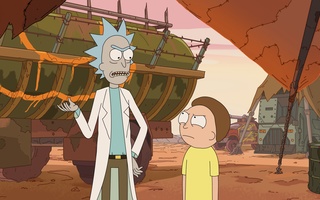{shortcode-222c3c8e7594f5cf7a0cc87db16f1c014bfca545}
A season finale faces the unfair challenge of resolving one tale and planting the seed for another. It must satisfy yet frustrate the audience. It must provide closure, yet still provide enough intrigue to inspire further viewing. This 90-minute finale buckles under the lofty expectations to which the show has beholden itself over the course of this season: continually promising Negan as the force of change that will derail the narrative from its frequent, undeniable inertia. Overlong, disjointed, and overwhelming, “Last Day On Earth” undoes itself as it progresses, muting what could have been an even more electrifying Negan reveal.
This episode’s problematic half deals with Morgan’s pursuit of Carol and his attempt to save her soul in his typical role as the group’s zen master. It is a protraction of the prior dull clash between Morgan’s humanity and Carol’s callousness. The writers have made it a point to show that neither extreme is superior and that both ends are necessary for survival. Carol and Morgan seemingly swap beliefs, with Carol feeling guilt over the act of killing and Morgan nonchalantly violating his mantra of not killing to save her life. The moment is made most poignant from the genuine shock of witnessing Morgan’s tragic lapse into the dangers of moral flexibility, unraveling all of the work he has done this season to treasure all life.
The process by which Carol and Morgan’s arcs come to this resolution is inexcusably ludicrous, however, no matter how well-intentioned it is. Carol’s captor somehow caught up to her from last episode’s massacre, in which she gunned down all of his friends. How he was able to track Carol, avoid running into Morgan, and pin her down, all with a gun wound, is another mystery that the show’s writers could never reasonably explain—which is why they tend not to bother with those details. Carol’s still-implausible reasoning for her histrionic departure was to avoid killing in order to protect her loved ones. In her mind, already heavily burdened by her extended history of murder sprees, she loves these people so much that she must abandon them in order to stop killing for them? Yet her abandoning them means they might also be better off? Her reasoning does not make sense. The show does its best to contextualize Carol’s logic as a sacrificial, noble act for others when in reality it appears obtuse, selfish, and pouty.
The other half of the episode, in which Rick and the remaining main cast transport Maggie to Alexandria, is handled slightly better. What is baffling is how Maggie’s mysterious birth complication happened to synchronize itself with the apex of all of the group’s other problems, particularly the Saviors. In scene after redundant scene, the group hits the Savior’s roadblocks, descending further into desperate panic. An effort is made to emphasize the Saviors’ frightening omnipresence and militant power, which have a tangible effect on these survivors. The Saviors toy with the survivors, picking them apart psychologically like a toddler playing with its food. They shoot at their feet and lead them into shows of power, at one point hanging a Hilltop member in front of their faces. Rick’s hubris gradually turns into abject horror upon his realization of his powerlessness and inability to control his fate: Crazy Rick, driven even crazier. The same effect, however, could have been accomplished with 10 fewer minutes dedicated to watching Rick and company run amok in general panic.
There are a few rushed moments of character growth, with Eugene affirming his “survivor” status by ostensibly sacrificing himself for the rest of the group in his suicidal plan of action. There is a touching moment between him and Abraham, wherein they genuinely reconcile their differences over past transgressions. Here, in another offbeat moment of musical melodrama, Bear McCreary composes a Giacchino-like piece, echoing something out of the saccharine depths of “Lost” to entrench these characters in sentimentality. After all, it just might be their last day on earth.
Finally, the moment viewers all over the world have been waiting for is tortuously delayed to the episode’s very last 10 minutes: Negan’s entrance. Virtually the entire show’s main cast is made to kneel in front of the group’s commandeered RV. McCreary applies playfully heinous tunes from the organ. Out comes Jeffrey Dean Morgan’s (The Comedian from “Watchmen”) Negan, with a chain-linked bat named Lucille brashly set upon his shoulder, waltzing about with the bravado of Captain Barbossa. Morgan’s performance is theatrical and indulgent as he shouts phrases such as “It’s pee-pee pants city around here” to demystify and clarify Negan’s type of psychopath; that is, he does not come off as conventionally psychopathic at all. He is boyishly charming rather than aloof and somewhat reasonable rather than irrational.
To make the inevitable comparison between Negan and Billy Bob Thornton’s recent, conventionally frightening, and compelling villain from “Fargo”, Negan is more transparent and down-to-earth. He speaks as he feels. Thornton’s antithetical villain was unnervingly quiet and twisted, making him a more unpredictable force of an insidious nature. Negan, not necessarily less compelling or interesting, is a pragmatic businessman first and foremost and seems to make more sense than any other character this season. He might extort and abuse, but only as driven by his strict adherence to the tenets of his “New World Order.” Follow his rules, and he will be fair. Violate them, and he will be unforgiving.
It is a joy to see Negan virtually twist the knife in Rick’s wounds, threatening Rick’s pride and family by taunting his bat in their faces with impunity. He even eeny-meeny-miny-moes the survivors to leave it up to chance who will die. Might his monologue have been overlong, overwritten, and overly divulgent? Maybe. Was it still a harrowing and viscerally uncomfortable experience to see our characters beaten down to a psychological pulp? Yes. In spite of the lofty expectations and hype surrounding the character, Negan’s introduction as post-apocalyptic judge, jury, and executioner—reiterating the theme that Rick and company were the real sinners here—is an unqualified success.
It is a shame, then, that the show cops out in its last moment. Negan’s presumed murder of one of our main survivors is depicted through a shameless POV shot, leaving the victim’s identity up in the air and the viewers with a screen full of tacky computer-generated blood. If the writers wish to remain consistent with the comic book lore, Glenn dies from Negan’s beating. If not, however, this would not be their first deviation from the canon.
Why not model the final shot after Jon Snow’s “death” scene in the most recent “Game of Thrones” finale: a close up of his bleeding body in the snow that still leaves wishful viewers believing he might still live? Not showing the victim is a cowardly directorial decision that blatantly serves to frustrate and suspend viewers into sticking around for next season, revealing a lack of faith in the story’s own staying power. This was not a “bad” finale, but it was not very good either due to the glut of plodding scenes that severely hampered its better moments. Still, Negan alone is enough to justify continued viewing—although loyal Walking Deadites are already locked in at this point anyway.
—Staff writer Richard Nguyen can be reached at richard.nguyen@thecrimson.com.
Read more in Arts
Music Video Breakdown: 'NO' by Meghan Trainor















